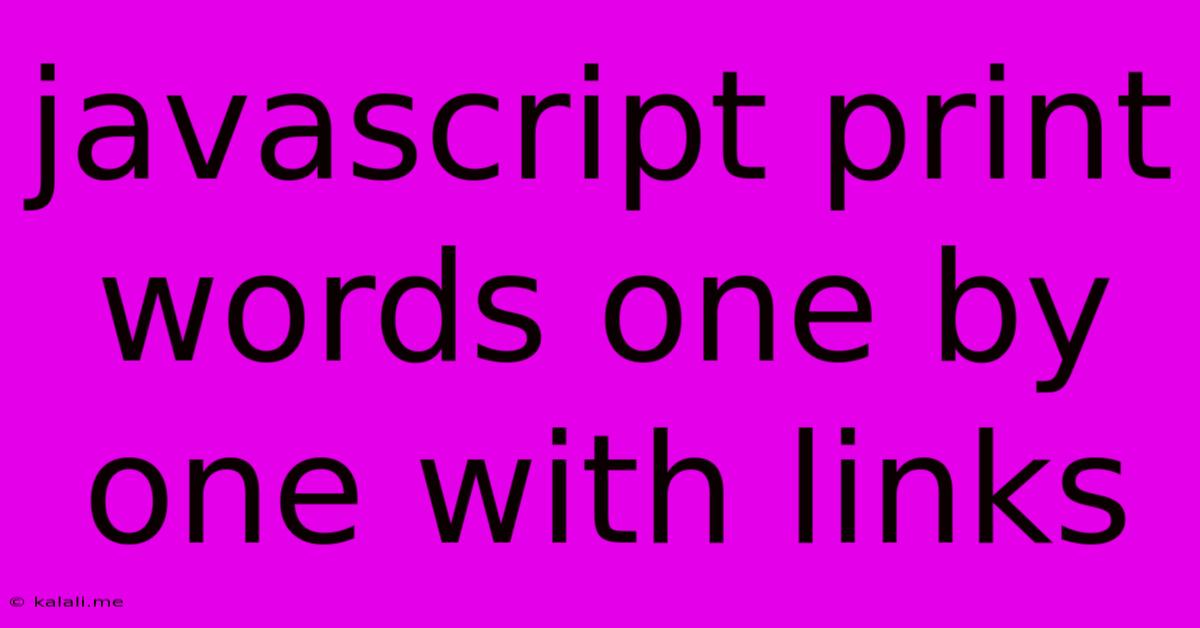Javascript Print Words One By One With Links
Kalali
Jun 02, 2025 · 3 min read

Table of Contents
JavaScript: Printing Words One by One with Links
This article explores how to dynamically print words from a string in JavaScript, one at a time, with each word linked to a separate URL. This technique is useful for creating engaging content, interactive tutorials, or visually appealing displays. We'll cover several approaches, ranging from simple implementations to more sophisticated methods handling diverse scenarios.
Why Print Words Individually?
Printing words one by one allows for a more controlled and visually appealing presentation of text. This is particularly useful for:
- Creating engaging introductions: Gradually revealing text can draw the reader in.
- Interactive tutorials: Displaying code snippets word by word can enhance understanding.
- Animated text displays: It can add a dynamic element to your web page.
- Accessibility improvements: For users with certain disabilities, slower reveal can aid comprehension.
Method 1: Basic Implementation with setTimeout
This method uses setTimeout to print one word at a time. It's simple but lacks sophisticated handling of edge cases.
function printWordsWithLinks(words, links) {
let i = 0;
function printNextWord() {
if (i < words.length) {
const word = words[i];
const link = links[i];
document.getElementById('output').innerHTML += `${word} `;
i++;
setTimeout(printNextWord, 500); // Adjust delay as needed
}
}
printNextWord();
}
const words = ["Hello", "World", "from", "JavaScript!"];
const links = ["https://www.example.com", "https://www.google.com", "https://www.wikipedia.org", "https://www.mozilla.org"];
printWordsWithLinks(words, links);
Remember to include a <div id="output"></div> in your HTML. This approach is straightforward but may become cumbersome for large datasets.
Method 2: Handling Asynchronous Operations and Error Cases
This enhanced method handles potential issues like mismatched word and link arrays and uses async/await for better control:
async function printWordsWithLinksAsync(words, links) {
if (words.length !== links.length) {
console.error("Error: Words and links arrays must be of the same length.");
return;
}
const outputDiv = document.getElementById('output');
for (let i = 0; i < words.length; i++) {
const word = words[i];
const link = links[i];
const linkElement = document.createElement('a');
linkElement.href = link;
linkElement.target = '_blank';
linkElement.textContent = word;
linkElement.style.marginRight = '5px'; // Added spacing for better readability
outputDiv.appendChild(linkElement);
await delay(500); // Use an async delay function
}
}
function delay(ms) {
return new Promise(resolve => setTimeout(resolve, ms));
}
const words2 = ["Learn", "More", "About", "JavaScript"];
const links2 = ["https://developer.mozilla.org/en-US/docs/Web/JavaScript", "https://www.javascript.com/", "https://www.w3schools.com/js/", "https://javascript.info/"];
printWordsWithLinksAsync(words2, links2);
This improved version uses async/await for better readability and error handling, making it more robust.
Method 3: Using Generators for More Complex Scenarios
For even more complex scenarios, like managing pauses, different delays per word, or other dynamic effects, consider using generators:
function* printWordsWithLinksGenerator(words, links) {
if (words.length !== links.length) {
throw new Error("Words and links arrays must have the same length.");
}
for (let i = 0; i < words.length; i++) {
yield { word: words[i], link: links[i] };
}
}
function displayWords(generator) {
const outputDiv = document.getElementById('output');
let next = generator.next();
const intervalId = setInterval(() => {
if (!next.done) {
const { word, link } = next.value;
const a = document.createElement('a');
a.href = link;
a.target = '_blank';
a.textContent = word;
a.style.marginRight = '5px';
outputDiv.appendChild(a);
next = generator.next();
} else {
clearInterval(intervalId);
}
}, 500);
}
const words3 = ["Explore", "the", "World", "of", "Web", "Development"];
const links3 = ["https://www.freecodecamp.org/", "https://developer.mozilla.org/", "https://www.w3schools.com/", "https://www.codecademy.com/", "https://www.udacity.com/", "https://coursera.org/"];
const generator = printWordsWithLinksGenerator(words3, links3);
displayWords(generator);
Generators provide a more elegant solution for complex sequences and dynamic control.
These examples demonstrate various methods to print words individually with links in JavaScript. The best approach depends on the complexity and specific requirements of your project. Remember to always handle potential errors and consider the user experience when implementing these techniques. Choose the method that best suits your needs and complexity level. Remember to adjust the delay (in milliseconds) within the setTimeout or delay functions to control the speed of the word reveal.
Latest Posts
Latest Posts
-
How Much Power Does A Pc Use
Jun 03, 2025
-
How Do You Stop A Razor Cut Bleeding
Jun 03, 2025
-
Mass Update List View Sharing Salesforce
Jun 03, 2025
-
Wh40k Worlds Exempt From Guard Tithe
Jun 03, 2025
-
How To Edit Statistics In Minecraft Java
Jun 03, 2025
Related Post
Thank you for visiting our website which covers about Javascript Print Words One By One With Links . We hope the information provided has been useful to you. Feel free to contact us if you have any questions or need further assistance. See you next time and don't miss to bookmark.